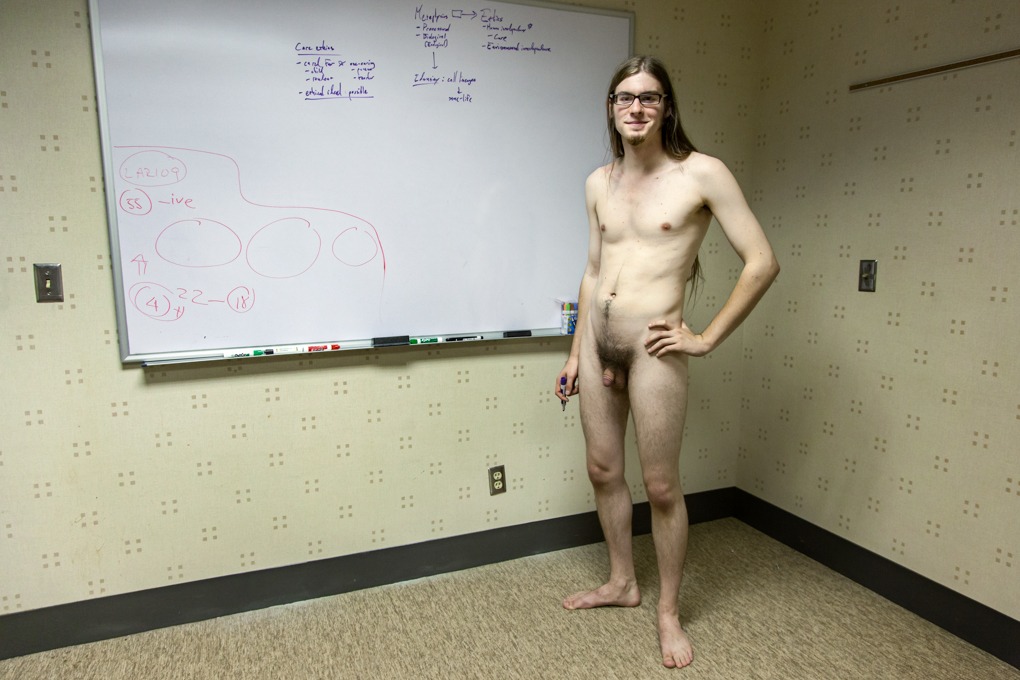Michael – USA
/in Uncategorized /by erica08
I come from small-city Kentucky, a place on the Ohio River, spreading up into the surrounding hills and forests. I was raised on camping trips and too many books. It leaves its impact. I’ve always been quiet, prone more to thought, first, than to hasty action. I study philosophy, and that’s a big part of my life. That’s the short and quick of my history.
I did this for me. It gives me the opportunity to view myself in ways that I otherwise cannot. We are all embodied, facing out. We cannot go outside of ourselves and look back at how we move in the world, but we may gain some other perspective from our representations through art. Seeing myself in this way, I think, could tell me a great deal about who I am. A whole realm of interactions is captured in a single picture of my body in media res. My body’s attitudes and positions are expressed in relation to the goings-on in my environment. A picture of me naked, without all my everyday trappings and doing something I love, makes more explicit to me the unconscious ways in which I move and act. It’s the sort of self-knowledge that helps challenge my own subjective experience.
But the project also presented another opportunity. I wanted, as part of the shoot, to try to articulate some of the things I have been thinking about. That’s what I’m doing, there, in front of the whiteboard. The body is often absent in my discipline. When it appears, it tends to be a brute fact or a mere means to Mind’s ends. I don’t agree with this. I am my body, the emergent sum of all the microbes and neurons and bone and blood and flesh. I am my heart, my hands, my feet, my brain, my hair, etc. Moreover, there are always bodies; there is never just one. The dependencies of our own bodies on others are vast and intricate, a product of millennia of cell lineage, mutations, reproduction. You cannot and I cannot be conceived outside of the environments which generate and nourish us
If there is beauty and meaning and truth, why is it that we could not find it there, in the grit of things? Biologically, all bodies are different. I said this during the shoot, and both Bri and Erica laughed at the obviousness. But this fact begs a question: why are different forms of bodies not considered beautiful? The answer is articulated in others of these essays. In short, “beauty” in our culture is a construction of societal norms, themselves dependent upon a proliferation of idealized images in mass media. But the construction is not determinate of what you or I will think. What we may find beautiful might deviate from the unattainable, airbrushed ideals seen on screens and billboards. Who interests us, arouses us, inspires us, may constitute a challenge to the monolithic ideals of masculine and feminine.
By and large, I am happy with my body. Some find it beautiful. There are still times when I feel inadequate, that I, quite literally, do not measure up to what is expected from a man. It comes and goes, and I feel this despite my own experience. However much we challenge, the images are still there in our memory. The relation between culture and biology has been stressed by a prevailing ideology viewing the organisms and environments of the world as mere compositions of discrete parts, to be recombined for the furthering of (certain) humans’ interests. We think less and less about where we came from, what we rely on, and in the pursuit of affluence, we destroy both the world and the beauty in it. Environmental troubles and body troubles, I think, are very much interconnected symptoms of shared causes
I live in Memphis, but I miss the hills. Every time I drive back home, or to Asheville, I get excited when the road curves. It rises and dips, flows with the curves of the mountains. The road is in some way different every time. Whether it’s the time I am driving, or the colors of the trees, the blooms on the flowers. It’s unpredictable, and invariably, beautiful.
